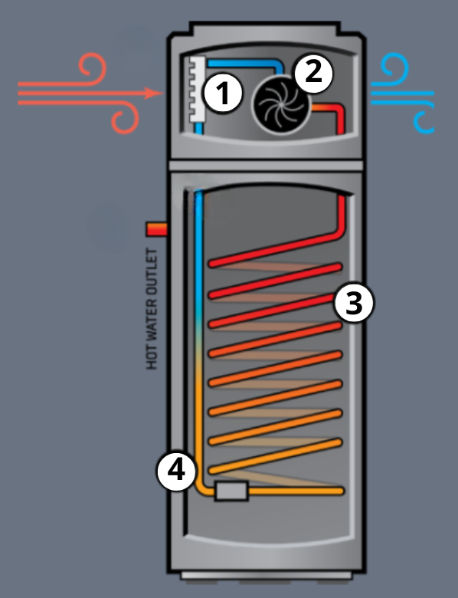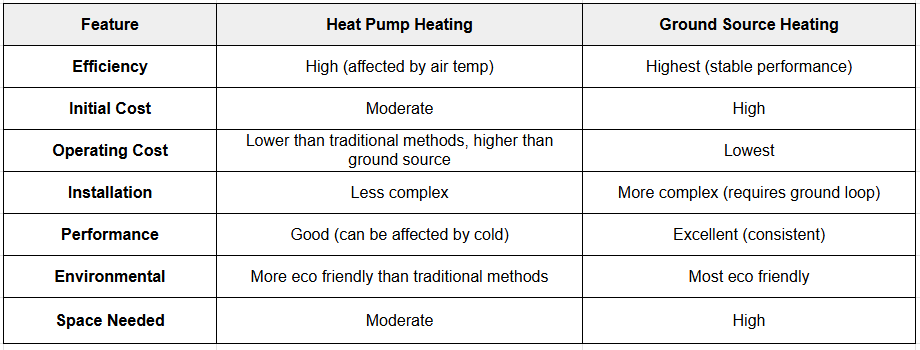Pool Heating: Choosing the Best Option for Your Swimming Pool
Tired of chilly pool water limiting your use all year round? Pool heating opens this possibility, allowing you to make the most of your swimming pool throughout the year. Whilst there are various options of types of pool heaters, efficiency and sustainability are increasingly important factors to consider.
This guide delves into the world of pool heating, with a specific focus on energy efficient solutions like heat pump heating and the sustainable power of ground source heating, helping you make the perfect decision for your swimming pool.

Why Heat Your Swimming Pool?
While there's an initial cost, heating your swimming pool provides benefits that can improve your way of life and potentially increase your home's value. While extending the swimming season is the most obvious advantage, there are more important reasons to think about pool heating.
🏊 Extending Your Swimming Season
This is the biggest motivation for many pool owners. Instead of being limited to the warmer months, pool heating allows you to comfortably enjoy your pool during spring, autumn, and even winter.
🏊 Enhanced Comfort and Enjoyment
Heated pool water is simply more inviting and encourages longer periods of use. The comfortable temperature makes the pool more enjoyable for everyone, from dedicated swimmers to families with young children.
💆 Therapeutic Benefits
Warm water has long been recognised for its remedial benefits. Swimming in a heated pool can help soothe muscle tension, ease joint discomfort, and help with relaxation.
🥳 Improved Social Gatherings
A heated pool becomes a focal point for social events, regardless of the time of year. Host memorable pool parties, family gatherings, or casual evenings with friends, knowing your guests will be comfortable and enjoy the warmth of the water.
💲 Potential Increase in Property Value
While not the only factor, a heated pool can be an attractive feature for potential buyers. A well maintained, heated pool adds to the appeal and perceived value of your home.
Pool Heating Options
There are various ways to heat your swimming pool, each with its own advantages and considerations. This section will introduce the main pool heating options, providing a starting point for understanding which might be right for you.
Solar Pool Heating
Solar systems typically involve panels installed on the roof, which collect solar energy and transfer it to the pool water. While the initial investment can vary, the long term operational costs are minimal, making it an attractive choice for those prioritising sustainability and long term savings.
Gas Pool Heating
Gas pool heaters offer a rapid and reliable method for heating swimming pools. Gas is burnt to directly heat the water, providing quick temperature increases and consistent performance regardless of weather conditions.
Gas heaters are a popular choice for those who need to heat their pool quickly or who live in areas with inconsistent sunlight. However, they typically have higher operational costs compared to solar or heat pump systems due to the cost of gas.
Heat Pump Pool Heating
Heat pump pool heaters offer an energy efficient and often more sustainable alternative to traditional heating methods. Unlike gas heaters that generate heat by burning fuel, heat pumps work by extracting heat from the surrounding air and transferring it to the pool water. This process is similar to how a refrigerator or air conditioner works, but in reverse.
Ground Source Pool Heating
Ground source pool heating, also known as geothermal pool heating, is a highly efficient and environmentally friendly method for heating swimming pools. This system utilises the temperature of the earth to heat the pool water. Pipes are buried underground, either horizontally or vertically, and a circulating fluid absorbs heat from the ground. This heat is then transferred to the pool water via a heat exchanger.
While the initial installation can be more complex and costly than other methods, ground source heating offers exceptional energy efficiency and consistent performance, making it a sustainable and cost effective option in the long run.
In summary, there are various ways to heat your pool, each with its own set of advantages and considerations. While options like solar, and gas offer different benefits, this guide will now focus on the most energy efficient and sustainable choices: heat pump pool heating and ground source pool heating.
These technologies offer significant long term benefits in terms of cost savings and environmental impact, making them impressive options for pool owners seeking both comfort and efficiency.

Heat Pump Heating
As previously mentioned, heat pump pool heating stands out as an efficient and sustainable method for maintaining comfortable pool temperatures.
How Do Heat Pump Pool Heaters Work?
The core principle behind heat pump operation is the transfer of heat from one place to another. Unlike traditional heaters that generate heat, heat pumps move existing heat. This process is extremely similar to how a refrigerator keeps food cold, but with the aim of warming water.
1️⃣ Evaporation
The refrigerant within the heat pump absorbs heat from the surrounding air as it passes through the evaporator coil. This causes the refrigerant to change from a liquid to a low pressure gas. The efficiency of this process can be influenced by the ambient air temperature and humidity.
2️⃣ Compression
The low pressure gas is then compressed by a compressor, which dramatically increases its temperature. This heated refrigerant is now ready to transfer its energy.
3️⃣ Condensation
The hot, high pressure refrigerant travels to the condenser coil, where it releases its heat to the pool water flowing through the heat exchanger. As it releases heat, the refrigerant cools and condenses back into a liquid.
4️⃣ Expansion
Finally, the liquid refrigerant passes through an expansion valve, reducing its pressure and temperature, and the cycle begins again.
Advantages of Heat Pump Systems
While energy efficiency is a key benefit, heat pumps offer several other advantages:
🥽 Extended Swimming Season
🥽 Low Operating Costs
🥽 Environmentally Friendly
🥽 Relatively Quiet Operation
🥽 Durable and Long Lifespan
Factors To Consider When Choosing a Heat Pump System
Selecting the right heat pump involves several considerations:
📏 Pool Size: This will determine the capacity of the heat pump that you will need.
🌡️ Desired Temperature: The temperature you wish to run your pool at will affect the heat pump’s workload.
💲 Budget: Whilst the operating costs are lower than other systems, the initial investment can be higher for heat pumps.
⚡ Coefficient of Performance (COP): Look for a heat pump with a high COP as this shows the energy efficiency of the system. A higher COP means more heat output for the energy input.
Installation and Maintenance of Heat Pumps
Proper installation is crucial for optimal heat pump performance. It's recommended to have a qualified professional install your heat pump, ensuring it's correctly sized and integrated with your pool's filtration system. Regular maintenance, such as cleaning the coils and checking refrigerant levels, will help maintain efficiency and prolong the life of your heat pump.
Ground Source Heating
Ground source (or geothermal) pool heating represents a highly efficient and sustainable approach to warming your swimming pool. Ground source heating uses the consistent temperature of the earth to produce reliable and cost effective heating.
How Do Ground Source Pool Heaters Work?
1️⃣ Heat Absorption
The fluid that circulates in the ground loop absorbs heat from the earth. The constant warm temperature of the ground provides efficient heat absorption, even in cold weather.
2️⃣ Heat Transfer to the Heat Pump
The fluid, having now been warmed by the ground, is pumped to the heat pump unit.
3️⃣ Heat Pump Cycle
In the heat pump unit, the same refrigeration process that occurs in a heat pump air conditioning takes place.The fluid transfers its heat to the refrigerant, which is then compressed, then heated more, and used by the heat exchanger to warm the pool water.
4️⃣ Return to the Ground
The cool fluid then goes back into the ground loop to absorb more heat and start the cycle again.
Advantages of Ground Source Heating
🥽 Exceptional Energy Efficiency
🥽 Environmentally Friendly
🥽 Consistent Heating Performance
🥽 Quiet Operation
🥽 Durable and Long Lifespan
Factors To Consider When Choosing a Ground Source System
💲 Higher Initial Cost: The upfront cost of installing a ground source system is typically higher than other heating options due to the cost of the ground loop installation.
👷 Complex Installation: The installation of the ground loop needs significant excavation and requires specialist equipment and expertise.
📏 Space Required: While vertical loops require less surface area, horizontal loops need plenty of land for trenches.
⛰️ Geological Factors: The type of soil and geological conditions can affect the efficiency and viability of a ground source system.
Comparing Heat Pump and Ground Source Heating
Both heat pump and ground source heating offer logical alternatives to traditional heating options. However, they differ in their mechanics, efficiency levels, and suitability for various places. Let's compare them to help you work out which might be the better choice for your pool.

Choosing the Right Pool Heating System
Choosing between heat pump and ground source heating ultimately depends on your individual needs, budget, and priorities.
If you consider long term cost savings, environmental responsibility, and consistent performance as priorities, and have the available land and budget for the initial investment, ground source heating is an excellent choice.
If you're looking for a highly efficient option with a lower upfront cost and less complex installation, a heat pump is your best bet. Carefully consider these factors to make the best decision for your pool heating needs.
Installation and Maintenance
Proper professional installation and consistent maintenance are crucial for maximising the performance, efficiency, and lifespan of your pool heating system. Whether you choose a heat pump, ground source, or another type of heater, regular inspections, servicing and maintaining your system will save you time, money, and potential headaches in the long run.
Conclusion
Choosing the right pool heating system is a significant decision that balances initial investment with long term use and operational costs. While options like solar, and gas, have their place, heat pump and ground source heating stand out as highly efficient and sustainable choices, offering significant benefits in terms of energy savings and environmental impact.
Ready to find the perfect pool heating solution for your needs? Contact the experts at Everyday Plumbing & Gas today on 1300 520 898 for professional advice and installation services.
Resources:
International Energy Agency - The Future of Heat Pumps
Smartly Energy - Air Source Heat Pumps vs Ground Source Heat Pumps: What's the Difference
NSW Climate and Energy Action - Geothermal energy
Department of Energy - Heat Pump Swimming Pool Heaters
Thermal Earth - Ground Source Heat Pumps for Swimming Pools
iStore - Energy Efficient Pool Heaters
Rheem - Pool Heating